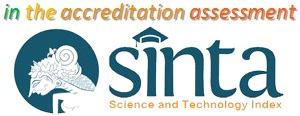The Impact of Early Weaning on Nutritional Status of Children Aged 6–24 Months in Cinambo
DOI:
https://doi.org/10.37034/medinftech.v3i1.69Keywords:
Child Nutrition, Cross-Sectional Analytical Design, Malnutrition Prevalence, Public Health, Weaning PracticesAbstract
The weaning period is critical as it marks the transition from breastfeeding to solid foods, during which infants are particularly susceptible to nutritional disorders. The optimal weaning age is generally around two years, as breastfeeding until this age significantly supports a child's growth. Factors influencing weaning include parental education, economic status, parental employment, and the age of weaning. The timing of weaning is related to nutritional status since a child's diet shifts from exclusively breast milk to a combination of breast milk and solid foods, with increased energy and nutritional needs. This study investigates the relationship between weaning age and nutritional status in children aged 6-24 months at Puskesmas Cinambo, Bandung City. Employing a cross-sectional analytical design, the population includes mothers of children in this age range, totaling 534 respondents. Accidental sampling yielded 118 respondents over one week. Data were collected through questionnaires and analyzed using univariate and bivariate methods, with significance set at p<0.05. Results indicated that 52.5% of respondents had normal nutritional status, while 47.5% were undernourished. Most weaning ages were found to be inappropriate, with 66.1% weaning before the recommended age of 24 months. The Spearman Rank test revealed a significant relationship (p=0.020), confirming H1. In conclusion, there is a relationship between weaning age and nutritional status in children aged 6-24 months at Puskesmas Cinambo. Health services should provide regular education on appropriate weaning practices to enhance the nutritional status of this age group.
Downloads
References
M. Yigezu et al., “Undernutrition and its determinants among children aged 6–59 months in Southern Ethiopia,” Scientific Reports, vol. 14, no. 1, Sep. 2024, doi: 10.1038/s41598-024-73182-5.
A. Riana, I. Harun, G. C. Irawan, and E. Amalia, " Maternal Nutrition Education Based on Maternal and Child Health (MCH) Book: Its Effect on Knowledge and Nutritional Status in Children Under Five Years of Age," Al GIZZAI: PUBLIC HEALTH NUTRITION JOURNAL, vol. 4, no. 2, pp. 178–188, 2024, doi: 10.24252/algizzai.v4i2.49411.
D. N. Akbar, M. G. Arfananda, S. Saladin, and Rudiana, "Study of the Implementation of Autonomy and Decentralization of the Bandung City Government in the Convergence of Stunting Prevention," Jurnal Kolaboratif Sains, vol. 8, no.1, pp. 443-453, 2025. doi: 10.56338/jks.v8i1.6764
Manullang, A. L., Sinaga, S., and Rahayu, A. P., "KORELASI ANTARA ASPEK PSIKOSOSIAL DAN SPIRITUAL DENGAN PENYAPIHAN DINI PADA ANAK USIA BADUTA: KORELASI ANTARA ASPEK PSIKOSOSIAL DAN SPIRITUAL DENGAN PENYAPIHAN DINI PADA ANAK USIA BADUTA," Jurnal Keperawatan Wiyata, vol. 2, no. 1, pp. 81–90, 2021.
L. Hou et al., “Impact of the Duration of Breastfeeding on the Intelligence of Children: A Systematic Review with Network Meta-Analysis,” Breastfeeding Medicine, vol. 16, no. 9, pp. 687–696, Sep. 2021, doi: 10.1089/bfm.2020.0364.
T. Idayanti et al., Ed., "Pentingnya Asi Eksklusif Dan Mp-Asi Di Masa Pertumbuhan Golden Period,". Bandung, Jawa Barat, Indonesia: CV. MEDIA SAINS INDONESIA, 2023.
P. A. Pramayoza, "PENGARUH MOBILISASI DINI TERHADAP TINGKAT NYERI PADA PASIEN POST LAPARATOMI DI RSUP DR M DJAMIL PADANG," Doctoral dissertation, Fakultas Keperawatan, Universitas Andalas, 2023.
S. Bintanah, M. Maskhanah, F. S. Nadia, and S. H. S. Putri, “Pengaruh Pemberian F 100 Terhadap Perubahan Berat Badan pada Balita Gizi Buruk di Rumah Sakit Bhakti Asih Brebes,” Jurnal Gizi, vol. 13, no. 1, p. 8, Aug. 2024, doi: 10.26714/jg.13.1.2024.8-16.
J. M. F. Pinheiro et al., “Feeding practices and early weaning in the neonatal period: a cohort study,” Revista de Saúde Pública, vol. 55, p. 63, Nov. 2021, doi: 10.11606/s1518-8787.2021055003248.
O. Abolurin, O. Oyelami, S. Oseni, M. Akinlosotu, K. Sodeinde, and A. Adekoya, “Relationship between breastfeeding practices and nutritional status of children aged 6-24 months in South-west Nigeria,” Annals of Health Research, vol. 7, no. 2, pp. 179–189, May 2021, doi: 10.30442/ahr.0702-09-128.
R. A. E. L. El-Sayed, N. M. Helaly, H. M. Ramadan, and S. E. S. Saleh, "Mothers' Knowledge Regarding Weaning Practices for Their Children Aged from 6 to 24 Months," Alexandria Scientific Nursing Journal, vol. 24, no. 1, pp. 77–88, 2022.
A. M. Metwally et al., “Promoting weaning practices and growth of Egyptian infants by using communication for behavioral development approach,” BMC Pediatrics, vol. 22, no. 1, Dec. 2022, doi: 10.1186/s12887-022-03741-0.
A. Pietravalle et al., “Incorrect Feeding Practices, Dietary Diversity Determinants and Nutritional Status in Children Aged 6–23 Months: An Observational Study in Rural Angola,” Children, vol. 10, no. 12, p. 1878, Nov. 2023, doi: 10.3390/children10121878.
P. K. Appiah et al., “Breastfeeding and weaning practices among mothers in Ghana: A population-based cross-sectional study,” PLOS ONE, vol. 16, no. 11, p. e0259442, Nov. 2021, doi: 10.1371/journal.pone.0259442.
A. A, A. Azeez, and A. S. Kumar, "Influence of Feeding Patterns on Nutritional Status of Children upto 2 Years," Influence of Feeding Patterns on Nutritional Status of Children upto 2 Years,” International Journal of Life Sciences, Biotechnology and Pharma Research, vol. 14, no. 2, pp. 622-626, Feb. 2025, doi: 10.69605/ijlbpr_14.2.2025.116.
S. Ganesan, J. Jayaraj, S. Geminiganesan, and M. Rajan, "A study on parental awareness of feeding practices in children in the age-group 12-24 months," Journal of preventive medicine and hygiene, vol. 62, no. 4, pp. E909–E917, 2021, doi: 10.15167/2421-4248/jpmh2021.62.4.2287.
J. Pearce and S. C. Langley‐Evans, “Comparison of food and nutrient intake in infants aged 6–12 months, following baby‐led or traditional weaning: A cross‐sectional study,” Journal of Human Nutrition and Dietetics, vol. 35, no. 2, pp. 310–324, Sep. 2021, doi: 10.1111/jhn.12947.
M. P. Akinyi and M. F. C. Achieng, “Influence of Complementary Feeding Practices on Nutritional Status of Children Between 6 to 24 Months in Kisumu County, Kenya”, Journal of Research in Social Science and Humanities, vol. 2, no. 2, pp. 1–6, Jan. 2023.
B. P. Mmbando et al., “Nutritional status of children under five years old involved in a seasonal malaria chemoprevention study in the Nanyumbu and Masasi districts in Tanzania,” PLOS ONE, vol. 17, no. 4, p. e0267670, Apr. 2022, doi: 10.1371/journal.pone.0267670.
S. M. Perdana, M. B. Butar, and M. N. H. Syah, “Study of Complementary Feeding and Children’s Nutritional Status in Jambi City,” Journal of Global Nutrition, vol. 4, no. 2, pp. 420–429, Nov. 2024, doi: 10.53823/jgn.v4i2.99.









